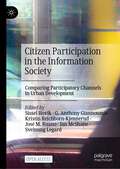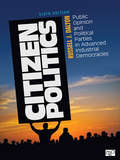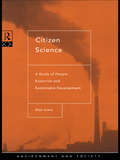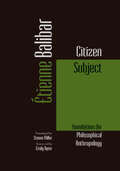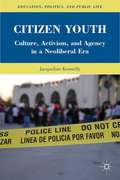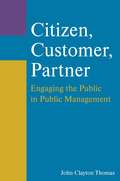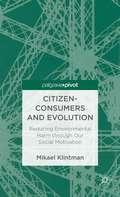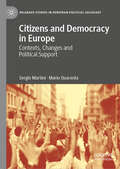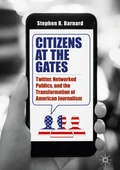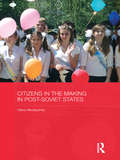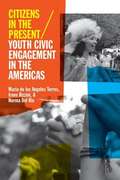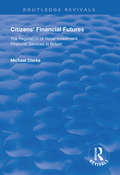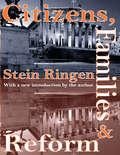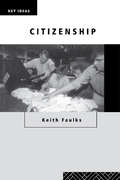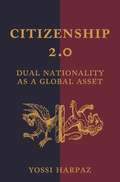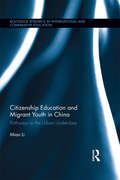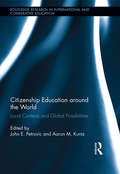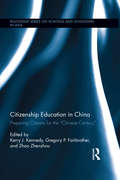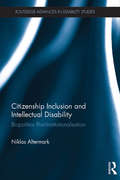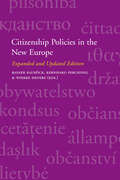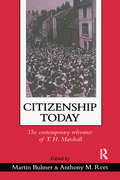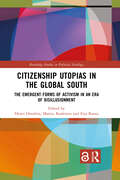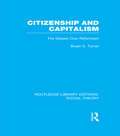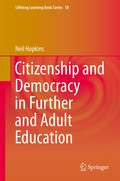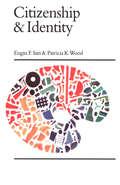- Table View
- List View
Citizen Participation in the Information Society: Comparing Participatory Channels in Urban Development
by Sissel Hovik G. Anthony Giannoumis Kristin Reichborn-Kjennerud José M. Ruano Ian McShane Sveinung LegardThis open access book examines how digital technologies are used to promote citizen participation in democratic urban development. It assesses the emergence, use, applicability and functions of digital modes of citizen participation in multiple cities around the world, where political regimes invite ordinary citizens to partake in policy processes through information technologies. The book also explores these initiatives alongside issues of democracy, social justice and power. It is an essential reference for practitioners, policymakers and academics interested in the relationship between citizen participation, technology and urban governance.
Citizen Politics: Public Opinion and Political Parties in Advanced Industrial Democracies
by Russell J. DaltonNow, more than ever, people drive the democratic process. What people think of their government and its leaders, how (or whether) they vote, and what they do or say about a host of political issues greatly affect the further strengthening or erosion of democracy and democratic ideals. This fully updated new sixth edition of Citizen Politics: Public Opinion and Political Parties in Advanced Industrial Democracies, by Russell J. Dalton, continues to offer the only truly comparative study of political attitudes and behavior in the United States, Great Britain, France, and Germany.In addition to its comprehensive, thematic examination of political values, political activity, voting, and public images of government within a cross-national context, Citizen Politics explores new forms of political activity, such as Internet-based activism and new forms of political consumerism. All chapters have been updated with the latest research and empirical evidence. Further, Dalton includes new discussions of citizen sophistication and its implications for democratic citizenship.
Citizen Science: A Study of People, Expertise and Sustainable Development (Environment and Society)
by Alan IrwinWe are all concerned by the environmental threats facing us today. Environmental issues are a major area of concern for policy makers, industrialists and public groups of many different kinds. While science seems central to our understanding of such threats, the statements of scientists are increasingly open to challenge in this area. Meanwhile, citizens may find themselves labelled as `ignorant' in environmental matters. In Citizen Science Alan Irwin provides a much needed route through the fraught relationship between science, the public and the environmental threat.
Citizen Subject: Foundations for Philosophical Anthropology (Commonalities)
by Étienne BalibarWhat can the universals of political philosophy offer to those who experience "the living paradox of an inegalitarian construction of egalitarian citizenship"? Citizen Subject is the summation of Étienne Balibar’s career-long project to think the necessary and necessarily antagonistic relation between the categories of citizen and subject. In this magnum opus, the question of modernity is framed anew with special attention to the self-enunciation of the subject (in Descartes, Locke, Rousseau, and Derrida), the constitution of the community as “we” (in Hegel, Marx, and Tolstoy), and the aporia of the judgment of self and others (in Foucualt, Freud, Kelsen, and Blanchot).After the “humanist controversy” that preoccupied twentieth-century philosophy, Citizen Subject proposes foundations for philosophical anthropology today, in terms of two contrary movements: the becoming-citizen of the subject and the becoming-subject of the citizen. The citizen-subject who is constituted in the claim to a “right to have rights” (Arendt) cannot exist without an underside that contests and defies it. He—or she, because Balibar is concerned throughout this volume with questions of sexual difference—figures not only the social relation but also the discontent or the uneasiness at the heart of this relation. The human can be instituted only if it betrays itself by upholding “anthropological differences” that impose normality and identity as conditions of belonging to the community.The violence of “civil” bourgeois universality, Balibar argues, is greater (and less legitimate, therefore less stable) than that of theological or cosmological universality. Right is thus founded on insubordination, and emancipation derives its force from otherness.Ultimately, Citizen Subject offers a revolutionary rewriting of the dialectic of universality and differences in the bourgeois epoch, revealing in the relationship between the common and the universal a political gap at the heart of the universal itself.
Citizen Youth
by Jacqueline KennellyWhat are the ties that bind the 'good youth citizen' and the youth activist in the twenty-first century? Contemporary young people are encouraged - through education and other cultural sites - to 'save the world' via community projects that resemble activism, yet increasingly risk arrest for public acts of dissent. Citizen Youth: culture, activism, and agency in a neoliberal era goes to the heart of these contradictions, exploring the dilemmas and cultural dynamics of being young and politically engaged. Through an ethnographic study of young people working on activist causes across the three largest urban centres in one of the wealthiest nations in the world (Toronto, Montreal, and Vancouver, Canada), this book draws on Bourdieusian cultural sociology, feminist theories of agency, phenomenology, and political theories of the state and neoliberalism to understand what it means to be a certain kind of youth citizen in the twenty-first century. Accessibly written yet theoretically engaged, the book will be of interest to individuals both within academia and in the wider world of social movements and youth engagement.
Citizen, Customer, Partner: Engaging the Public in Public Management
by John Clayton ThomasFor almost a half a century, scholars and practitioners have debated what the connections should be between public administration and the public. Does the public serve principally as citizen-owners, those to whom administrators are responsible? Are members of the public more appropriately viewed as the customers of government? Or, in an increasingly networked world, do they serve more as the partners of public administrators in the production of public services? This book starts from the premise that the public comes to government not principally in one role but in all three roles, as citizens and customers and partners. The purpose of the book is to address the dual challenge that reality implies: (1) to help public administrators and other public officials to understand the complex nature of the public they face, and (2) to provide recommendations for how public administrators can most effectively interact with the public in the different roles. Using this comprehensive perspective, Citizen, Customer, Partner helps students, practitioners, and scholars understand when and how the public should be integrated into the practice of public administration. Most chapters in Citizen, Customer, Partner include multiple boxed cases that illustrate the chapter’s content with real-world examples. The book concludes with an extremely useful Appendix that collects and summarizes the 40 Design Principles – specific advice for public organizations on working with the public as customers, partners, and citizens.
Citizen-Consumers and Evolution: Reducing Environmental Harm through Our Social Motivation
by Mikael KlintmanThis book develops a groundbreaking, novel approach to examining ethical consumer behaviour from the perspective of evolutionary theory, illustrating the deeply rooted potentials and limits within society for reducing environmental harm.
Citizens and Democracy in Europe: Contexts, Changes and Political Support (Palgrave Studies in European Political Sociology)
by Mario Quaranta Sergio MartiniThis book provides an innovative and in-depth analysis of how attitudes towards democracy and political institutions differ across 31 countries in Europe, and how these attitudes have fluctuated over time. After addressing conceptual and measurement issues about the evaluative dimension of political support, the authors develop a unique framework assessing the role of the institutional format, the quality of the political process, macro-economic conditions and inequality to explain trends and differences in political satisfaction and trust. The book further explores how education, employment and electoral status create gaps in political support. Citizens and Democracy in Europe will be of interest to students and scholars in comparative politics, political sociology and public opinion.
Citizens at the Gates: Twitter, Networked Publics, and the Transformation of American Journalism
by Stephen R. BarnardDrawing insights from nearly a decade of mixed-method research, Stephen R. Barnard analyzes Twitter’s role in the transformation of American journalism. As the work of media professionals grows increasingly hybrid, Twitter has become an essential space where information is shared, reporting methods tested, and power contested. In addition to spelling opportunity for citizen media activism, the normalization of digital communication adds new channels of influence for traditional thought leaders, posing notable challenges for the future of journalism and democracy. In his analyses of Twitter practices around newsworthy events—including the Boston Marathon bombing, protests in Ferguson, Missouri, and the election of Donald Trump—Barnard brings together conceptual and theoretical lenses from multiple academic disciplines, bridging sociology, journalism, communication, media studies, science and technology studies, and political science.
Citizens in the Making in Post-Soviet States (BASEES/Routledge Series on Russian and East European Studies)
by Olena NikolayenkoThe political outlook of young people in the countries of the former Soviet Union is crucial to their countries’ future political development. This is particularly relevant now as the first generation without firsthand experience of communism at first hand is approaching adulthood. Based on extensive original research and including new survey research amongst young people, this book examines young people’s political outlook in countries of the former Soviet Union; it compares and contrasts Russia, where authoritarianism has begun to reassert itself, and Ukraine, which experienced a democratic breakthrough in the aftermath of the Orange Revolution. The book examines questions such as: How supportive is this new generation of the new political order? What images of the Soviet Union prevail in the minds of young people? How much trust does youth place in current political and public institutions? Addressing these questions is crucial to understanding the extent to which the current regimes can survive on the wave of public support. The book argues that Russian adolescents tend to place more trust in the incumbent president and harbour more regrets about the disintegration of the Soviet Union than their peers in Ukraine; it demonstrates that young people distrust political parties and politicians, and that patriotic education shapes social and political values.
Citizens in the Present: Youth Civic Engagement in the Americas
by Irene Rizzini Maria De Torres Norma Del RioAlthough media coverage often portrays young people in urban areas as politically apathetic or disruptive, this book provides an antidote to such views through narratives of dedicated youth civic engagement and leadership in Chicago, Mexico City, and Rio de Janeiro. This innovative comparative study provides nuanced accounts of the personal experiences of young people who care deeply about their communities and are actively engaged in a variety of public issues. Drawing from extensive interviews and personal narratives from the young activists themselves, Citizens in the Present presents a vibrant portrait of a new, politically involved generation.
Citizens' Financial Futures: Regulation of Retail Investment Financial Services in Britain (Routledge Revivals)
by Michael ClarkePublished in 1999, this is a review of recent changes in the regulation of retail financial investment services and products, notably the creation of the Personal Investment Authority and the continuing roles of the Office of Fair Trading and the Securities and Investments Board. The attempt to establish new regulatory standards in the wake of the personal pensions mis-selling and other scandals is critically appraised in the light of evidence of the needs and capacities of citizens. The book concludes, firstly that the regulators have not succeeded in making more than a limited progress in preventing the tendencies of the industry to abuse the public, and secondly, that the model of regulatory effectiveness which they espouse, based on creating a competitive market of informed decision-makers, is inappropriate given the complexity of the products in question. No systematic appraisal of the development of retail financial services regulation exists, other than those conducted by the regulators themselves.
Citizens, Families, and Reform
by Stein RingenModern families are economic institutions of great productivity. They contribute as much to a society's economic well-being as does worker productivity in formal markets. In Citizens, Families, and Reform, Stein Ringen shows how long-standing inequalities of income and class are flexible and changing in post-industrial societies. Such inequalities respond to structural changes such as social mobility and to public policies such as those of the welfare state. His book is a study of the process from careful statistical analysis to specific policy recommendations.The book draws on two strands of research, one on children and families and the other on social inequality. Both summarize detailed statistical analysis. Ringen's basic premise is that prudent social policy should start from investment in families. Progress and reform in society, such as extended access to education, tends to modify social divisions and stimulate open opportunity, particularly in the area of higher education. The book addresses the situation of children, who have a surprisingly lower standard of living than adult population groups by most measures of well-being. Ringen attributes this disparity to flaws in the distribution of power, which leads to the disenfranchisement of children as citizens. He addresses this problem by discussing children and voting rights, building a case for realizing the ideal of one person, one vote, by extending the vote to children.Real democracies are necessarily imperfect. Ringen argues for the classical liberal theory of social progress through economic growth and equality of opportunity and warns against the "terrible temptation towards perfection." His new introduction reviews the debates sparked by the book's original publication in 1997 and suggests areas in which his arguments have been vindicated.
Citizenship (Key Ideas)
by Keith FaulksThis book presents a clear and comprehensive overview of citizenship, which has become one of the most important political ideas of our time. The author, an experienced textbook writer and teacher, uses a postmodern theory of citizenship to ask topical questions as:* Can citizenship exist without the nation-state?* What should the balance be between our rights and responsibilities?* Should we enjoy group as well as individual rights?* Is citizenship relevant to our private as well as our public lives?* Have processes of globalisation rendered citizenship redundant?
Citizenship 2.0: Dual Nationality as a Global Asset (Princeton Studies in Global and Comparative Sociology)
by Yossi HarpazCitizenship 2.0 focuses on an important yet overlooked dimension of globalization: the steady rise in the legitimacy and prevalence of dual citizenship. Demand for dual citizenship is particularly high in Latin America and Eastern Europe, where more than three million people have obtained a second citizenship from EU countries or the United States. Most citizenship seekers acquire EU citizenship by drawing on their ancestry or ethnic origin; others secure U.S. citizenship for their children by strategically planning their place of birth. Their aim is to gain a second, compensatory citizenship that would provide superior travel freedom, broader opportunities, an insurance policy, and even a status symbol.Drawing on extensive interviews and fieldwork, Yossi Harpaz analyzes three cases: Israelis who acquire citizenship from European-origin countries such as Germany or Poland; Hungarian-speaking citizens of Serbia who obtain a second citizenship from Hungary (and, through it, EU citizenship); and Mexicans who give birth in the United States to secure American citizenship for their children. Harpaz reveals the growth of instrumental attitudes toward citizenship: individuals worldwide increasingly view nationality as rank within a global hierarchy rather than as a sanctified symbol of a unique national identity.Citizenship 2.0 sheds light on a fascinating phenomenon that is expected to have a growing impact on national identity, immigration, and economic inequality.
Citizenship Education and Migrant Youth in China: Pathways to the Urban Underclass (Routledge Research in International and Comparative Education)
by Miao LiIn East Asian economies such as China, recent mass rural-urban migration has created a new urban underclass, as have their children. However, their inclusion in urban public schools is a surprisingly slow process, and youth identities in newly industrialized countries remain largely neglected. Faced with monetary and institutional barriers, the majority of migrant youth attend low-quality or underperforming migrant schools, without access to the free compulsory education enjoyed by their urban counterparts. As a result, China’s citizen-building scheme and the sustainability of its labor-intensive economy have greatly impacted global economic restructuring. Using thorough ethnographic research, this volume examines the consequences of urban schooling and citizenship education through which school and social processes contribute to the production of unequal class relations. It explores the nexus of citizenship education and identity-forming practices of poor migrant youth in an attempt to foresee the new class formation in Chinese society. This volume opens up the "black box" of citizenship education in China and examines the effect of school and societal forces on social mobility and life trajectories.
Citizenship Education around the World: Local Contexts and Global Possibilities (Routledge Research in International and Comparative Education)
by John E. Petrovic Aaron M. KuntzThough certainly not a new idea, citizenship education manifests in unique and often unpredictable ways in our contemporary neoliberal era. The question of what it means to be a productive and recognized citizen must now be understood simultaneously along both global and local lines. This edited volume offers an international perspective on citizenship education enacted in specific socio-political contexts. Each chapter includes a pointed conceptualization of citizenship education—a philosophical framework—that is then applied to specific national cases across Europe, Asia, Canada and more. Chapters emphasize how such frameworks are implemented within local contexts, encouraging particular pedagogical/curricular practices even as they constrain others. Chapters conclude with suggestions for productive change and how educators might usefully engage contemporary contexts through citizenship education.
Citizenship Education in China: Preparing Citizens for the "Chinese Century" (Routledge Series on Schools and Schooling in Asia)
by Kerry J. Kennedy Gregory P. Fairbrother Zhao ZhenzhouThere is a flourishing literature on citizenship education in China that is mostly unknown in the West. Liberal political theorists often assume that only in democracy should citizens be prepared for their future responsibilities, yet citizenship education in China has undergone a number of transformations as the political system has sought to cope with market reforms, globalization and pressures both externally and within the country for broader political reforms. Over the past decade, Chinese scholars have been struggling for official recognition of citizenship education as a key component of the school curriculum in these changing contexts. This book analyzes the citizenship education issues under discussion within China, and aims to provide a voice for its scholars at a time when China’s international role is becoming increasingly important.
Citizenship Inclusion and Intellectual Disability: Biopolitics Post-Institutionalisation (Routledge Advances in Disability Studies)
by Niklas AltermarkWhat happens when a group traditionally defined as lacking the necessary capacities of citizenship is targeted by government programs that have made ‘citizenship inclusion’ their main goal? Combining theoretical perspectives of political philosophy, social theory, and disability studies, this book untangles the current state of Western intellectual disability politics following the replacement of state institutionalisation by independent and supported living, individual rights, and self-determination. Taking its cue from Foucault’s conception of ‘biopolitics’, denoting the government of the individuals and the totality of the population, its overarching argument is that the ambiguous positioning of people with intellectual disabilities with respect to the ideals of citizenship results in a regime of government that simultaneously includes and excludes people of this group. On the one hand, its members are projected to become ideal-citizens via the cultivation of citizenship capacities. On the other, the right to live independently and by their own choices is curtailed as soon as they are seen as failing with respect to the ideals of reason and rationality. Therefore, coercion, restraints, and paternalism, which were all supposed to end with deinstitutionalisation, are still ingrained in services targeting the group. In equal parts a theoretical work, advancing debates of critical disability theory, social theory, and post-structural philosophy, as well as an empirical engagement with the history of intellectual disability politics and the ways in which present day politics target the group, this book will be of interest to all students and scholars of disability studies, disability politics, and political theory.
Citizenship Policies in the New Europe: Expanded and Updated Edition (IMISCOE Research)
by Rainer Bauböck Wiebke Sievers Bernhard PerchinigThe two most recent EU enlargements in May 2004 and in January 2007 have greatly increased the diversity of historic experiences and contemporary conceptions of statehood, nation-building and citizenship within the Union. How did newly formed states determine who would become their citizens? How do countries relate to their large emigrant communities, to ethnic kin minorities in neighbouring countries and to minorities in their own territory? And to which extent have their citizenship policies been affected by new immigration and integration into the European Union? Citizenship Policies in the New Europe describes the citizenship laws in each of the twelve new countries as well as in the accession states Croatia and Turkey and analyses their historical background. Citizenship Policies in the New Europe complements two volumes on Acquisition and Loss of Nationality in the fifteen old Member States published in the same series in 2006.
Citizenship Today: The Contemporary Relevance Of T.H. Marshall
by Anthony M. Rees Martin BulmerThe contributors apply Marshall's dominant conception of citizenship to key areas of social scientific study such as power, income distribution, work and technology, family responsibilities, the environment and the underclass. The book is intended for undergraduate and postgraduate students on courses in sociological theory, social inequality, social policy and political theory.
Citizenship Utopias in the Global South: The Emergent Forms of Activism in an Era of Disillusionment (Routledge Studies in Political Sociology)
by Henri OnoderaCitizenship Utopias in the Global South is an edited collection of empirical research that explores emergent forms of activism in Africa, Asia, and Latin America in times of multiple crises. At the intersection of hope and disillusionment, the diverse and thought-provoking chapters investigate emerging forms of activism in the Global South – including youth activisms, anti-racism struggles, feminist initiatives, online dissent, and Indigenous movements.In the 2020s, many parts of the world are witnessing contradictory processes of popular claims to rights, livelihoods, and social justice, and subsequent forms of populist authoritarianism and the securitization of civil society. Previously hopeful calls for dignity, democracy, and social justice – through protesting, strikes, civil society campaigns, legal reforms, and elections, for example – have been met with disdain and civic disengagement. This book investigates the re-imagination and pursuit of citizen activism in such times of popular disillusionment. It explores citizenship utopias as social imaginaries that are enacted and that articulate an ideal social order or democratic polity with ideal forms of experiencing citizenship. Its chapters interrogate conventional approaches to citizenship by introducing a nuanced and empirically grounded exploration of the complex ways in which people experience, negotiate, and engage in the societal changes that they aspire towards. The examination of citizenship utopias outlines contemporary signals for transformative futures and their possibilities.The book undertakes a fresh effort at contributing to the shifting terrain of critical development studies, political anthropology, political sociology, and decolonising scholarship by engaging in discussions about citizenship, activism, disillusionment, and future societal alternatives in times of multiple global challenges.The Open Access version of this book, available at www.taylorfrancis.com, has been made available under a Creative Commons Attribution (CC-BY) 4.0 license.
Citizenship and Capitalism: The Debate over Reformism (Routledge Library Editions: Social Theory #Vol. 21)
by Bryan S. TurnerIn this study of politics in capitalist society Bryan Turner explores the development of citizenship as a way of demonstrating the effective use of political institutions by the working class and other subordinate groups to promote their interests. Marxist criticisms of reformism are rejected; it is shown that subordinate groups can achieve significant advances in social and economic rights, and that democracy is not a sham but a necessary mechanism for the pursuit of interests.
Citizenship and Democracy in Further and Adult Education (Lifelong Learning Book Series #18)
by Neil HopkinsThis book addresses the questions why citizenship education is an important subject for students in further and adult education and why we need democratic colleges to support the study of citizenship education. It investigates the historical roots of further and adult education and identifies how the adoption of citizenship education in the post-compulsory sector can enrich vocational studies in further education and programmes in adult education. It is argued that democratic colleges are vital to ensure that citizenship education informs the decision-making process throughout educational institutions (and as a means of establishing fair and equal representation for important stakeholders). The author has worked in both sectors for over a decade, and uses this experience to offer a blend of educational practice and philosophical investigation. The result is a work that appeals to both teachers in further and adult education as well as academics and students interested in philosophy of education.
Citizenship and Identity (Politics and Culture series)
by Engin F. Isin Patricia K. WoodThrough a detailed introductory discussion of the relation between the civil and the political, and between recognition and representation, this book provides a comprehensive vocabulary for understanding citizenship. It uses the work of T H Marshall to frame the critical interrogation of how ethnic, technological, ecological, cosmopolitan, sexual and cultural rights relate to citizenship. The authors show how the civil, political and social meanings of citizenship have been redefined by postmodernization and globalization.
